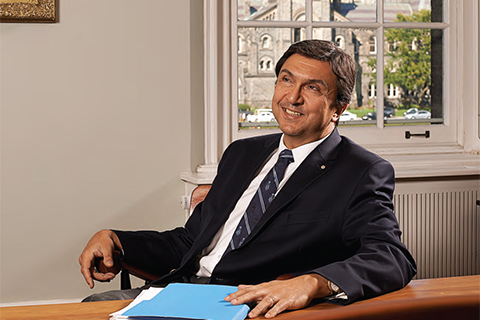The equilibrium of the global ecosystem is under serious threat owing to unsustainable patterns of resource consumption in both industrialized nations and rapidly developing economies. Researchers at all three University of Toronto campuses are deeply engaged in the quest for solutions to the world’s most vexing environmental problems. And our students are not only contributing to the university’s research efforts, but leading the charge to reduce the carbon footprint of the university itself.
In a brief column, I can’t begin to catalogue the range of innovative activities underway. For example, a number of scientists are helping position the University of Toronto – and Canada – as a world leader in solar energy research. Engineering professors Ted Sargent and Nazir Kherani, in distinctive but complementary projects, are each using nanotechnology to boost the amount of electricity that solar cells yield. Tim Bender, also an engineering professor, is working on creating organic solar cells that when stacked together absorb the full range of the light spectrum. And Greg Scholes, in the department of chemistry, is studying photosynthesis – the process by which plants and algae convert sunlight to energy – to understand how solar cells can be made more efficient.
On the consumption side of the equation, almost half of the world’s population relies on rice as a food staple. Professor Herbert Kronzucker, a plant biologist at U of T Scarborough, is investigating ways to improve the yield of rice crops as a potential solution to world hunger.
Many discoveries made at U of T are already being applied in the “real world.” As one example, in March, Biox became the first publicly traded biodiesel company in Canada. The company, based in Oakville, Ontario, uses a process that chemistry professor David Boocock developed at U of T in the 1990s to convert waste animal fat into a clean-burning biodiesel fuel.
U of T, as always, is making its largest mark by educating tomorrow’s environmental leaders. There are literally hundreds of courses across all three campuses that bear on sustainability and environmental issues. Students can prepare themselves to create a greener future with offerings from engineering, geology, physics, chemistry, geography, public policy, law and international development, among other disciplines. The Centre for Environment serves as an important umbrella on the St. George Campus. And the department of physical and environmental sciences at U of T Scarborough is now developing a trans-disciplinary PhD program in the field – the first of its kind at U of T.
Our students, raised during an era of heightened environmental concerns, have initiated many projects geared toward making the university itself a more sustainable place. Some fall under the auspices of the St. George Sustainability Office. Others defy categorization: Investors without Borders, a group based at U of T Mississauga, is overseeing a global competition among university students to identify environmentally sound investment opportunities in the renewable energy sector.
The university, happily, has a long history in the field of sustainability. Pollution Probe had its origins at the University of Toronto in 1969, with zoologist Donald A. Chant mentoring a group of committed student activists. The St. George Campus recycling operation, launched in 1991, is now one of the most comprehensive and successful in North America. Other initiatives, however, reflect new technologies. This year, the administration is collaborating with an industrial partner to test window coatings for use in our heritage buildings, and also engaged in a large-scale field test of induction and LED outdoor lights.
In sum, the challenges facing our hot and crowded planet are truly daunting. At home or abroad, your university is committed to being part of the solutions to the complex challenges of sustainable global development. We are also proud that many of today’s students will be joining thousands
of University of Toronto alumni who are already playing a catalytic role in sustainability initiatives and green enterprises all over the world.
Sincerely,
David Naylor
Recent Posts
For Greener Buildings, We Need to Rethink How We Construct Them
To meet its pledge to be carbon neutral by 2050, Canada needs to cut emissions from the construction industry. Architecture prof Kelly Doran has ideas
U of T’s 197th Birthday Quiz
Test your knowledge of all things U of T in honour of the university’s 197th anniversary on March 15!
Are Cold Plunges Good for You?
Research suggests they are, in three ways






One Response to “ Our Green Future ”
Actually, many alumni are working for green jobs. For example, I am working in Dalian TianDi, the largest green real estate project in China now and in charge of the Zero Carbon Park. Our real role is to wake more people up to save the planet.